Metallurgy
Metallurgy
All 9 results
Sort by
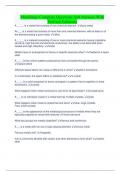
-
Metallurgy Complete Questions And Answers With Verified Solutions
- Exam (elaborations) • 6 pages • 2023
- Available in package deal
-
- $10.99
- + learn more
Metallurgy Complete Questions And Answers With Verified Solutions Metallurgy Complete Questions And Answers With Verified Solutions
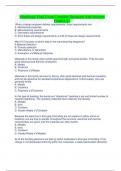
-
Metallurgy Final Exam Complete Questions And Answers Graded A+
- Exam (elaborations) • 25 pages • 2023
- Available in package deal
-
- $12.49
- + learn more
Metallurgy Final Exam Complete Questions And Answers Graded A+ Metallurgy Final Exam Complete Questions And Answers Graded A+
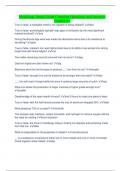
-
Metallurgy Study Guide Complete Questions And Answers Graded A+
- Exam (elaborations) • 10 pages • 2023
- Available in package deal
-
- $12.49
- + learn more
Metallurgy Study Guide Complete Questions And Answers Graded A+ Metallurgy Study Guide Complete Questions And Answers Graded A+
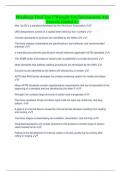
-
Metallurgy Final Test T/Wrought Verified Questions And Answers Graded A+
- Exam (elaborations) • 7 pages • 2023
- Available in package deal
-
- $11.99
- + learn more
Metallurgy Final Test T/Wrought Verified Questions And Answers Graded A+ Metallurgy Final Test T/Wrought Verified Questions And Answers Graded A+
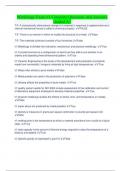
-
Metallurgy Exam #1 Complete Questions And Answers Graded A+
- Exam (elaborations) • 8 pages • 2023
- Available in package deal
-
- $11.99
- + learn more
Metallurgy Exam #1 Complete Questions And Answers Graded A+ Metallurgy Exam #1 Complete Questions And Answers Graded A+
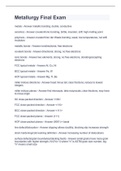
-
Metallurgy Final Exam 2022
- Exam (elaborations) • 10 pages • 2022
-
- $8.99
- + learn more
metals metallic bonding, ductile, conductive ceramics covalent/ionic bonding, brittle, insulator, stiff, high melting point 00:06 01:31 polymers covalent/Van der Waals bonding, weak, low temperatures, not stiff, insulators metallic bonds nondirectional, free electrons covalent bonds directional, strong, no free electrons ionic bonds two elements, strong, no free electrons, donating/accepting electrons FCC typical metals Al, Cu, Ni ...
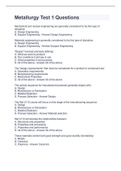
-
Metallurgy Test 1 Questions and answers 2022
- Exam (elaborations) • 18 pages • 2022
-
- $10.99
- + learn more
Mechanical and nuclear engineering are generally considered to be this type of discipline: A. Design Engineering B. Support Engineering Design Engineering Materials engineering is generally considered to be this type of discipline: A. Design Engineering B. Support Engineering Support Engineering 00:38 01:31 "Design" involved precisely defining: A. What we want to produce B. The conditions it will see in use C. What properties it must possess D. All of the above A...
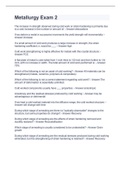
-
Metallurgy Exam 2 with complete solutions 2022
- Exam (elaborations) • 5 pages • 2022
-
- $9.99
- + learn more
The increase in strength observed during cold work or strain hardening is primarily due to a vast increase in the number or amount of: dislocations If we deform a metal in successive increments the yield strength will incrementally: increase If a small amount of cold work produces a large increase in strength, the strain hardening coefficient, n, would be ___. high Cold work strengthening is highly effective for metals with this crystal structure: FCC A flat plate of meta...
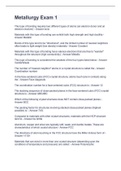
-
Metallurgy Exam 1 2022 with complete solutions
- Exam (elaborations) • 4 pages • 2022
-
- $8.99
- + learn more
This type of bonding requires two different types of atoms (an electron donor and an electron receiver) Ionic Materials with this type of bonding can exhibit both high strength and high ductility Metallic 00:40 01:31 Bonds of this type tend to be "directional", and the limited number of nearest neighbors often leads to light weight (low density) materials Covalent Materials with this type of bonding have valence electrons that are free to "wander" throughout the s...

That summary you just bought made someone very happy. Also get paid weekly? Sell your study resources on Stuvia! Discover all about earning on Stuvia


